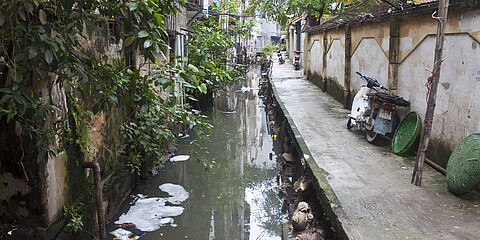
Wastewater Management in Provincial Towns in Vietnam
In 2000, the Federal Government and Vietnamese government agreed on a programme to support wastewater management, with the aim of installing central sewage treatment plants in nine provincial capitals. However, the project was subject to delays lasting several years. DEval investigated the structural causes of these delays. The evaluation was completed in 2019.
The project was planned as a cooperation project between the KfW and what was then GTZ. As part of the technical cooperation, the ministry responsible, the provincial governments and the operators of sewage treatment plants were advised on legal, organisational, technical and commercial issues in wastewater management. The investment measures for establishing waste water systems including pumping stations and sewage treatment plants were processed through the financial cooperation. For this purpose, the project assigned loans amounting to a total of EUR 136 million to Vietnam through the KfW
The close connection between technical and financial cooperation is a particular characteristic of German bilateral development cooperation. It is expected to provide particular added value in the implementation of major infrastructure projects. The delays in the implementation of the project, lasting more than ten years in some cases, give rise to the question as to whether and how the steering and implementation of such complex projects can be improved.
Key results and recommendations
- The characteristic features of the administration and construction sectors and the specific circumstances of wastewater disposal in Vietnam were not recognised or not sufficiently taken into account in the scheduling.
-
The characteristic features of the administration and construction sectors and the specific circumstances of wastewater disposal in Vietnam were not recognised or not sufficiently taken into account in the scheduling.
- The communication within the programme clearly needs a great deal of improvement.
-
The experts from the two implementing organisations should be prepared for the content of a joint programme and intensively involved in programme coordination. In addition, problems in the project implementation should be addressed in detail at an early stage so that the BMZ can take appropriate countermeasures at political level.
- The different legal foundations, communication structures and processes involved in technical and financial cooperation call the advantages of joint programmes into question.
-
The desired added value can only be achieved if the implementation of the individual modules is well coordinated in terms of both time and content. The “cooperation project” instrument of development cooperation should be systematically evaluated in order to determine whether it really does have positive effects in its present form.
The evaluation was completed in 2019. This is a summary of the results and recommendations; you can find the complete results and recommendations in the report.
Background
In order to achieve the ambitious Sustainable Development Goals (SDGs), it will be essential not only to establish the necessary institutional conditions, but also to fund the policies and infrastructure that are necessary for the successful implementation of the objectives.
Global development policy debate is therefore placing an emphasis on the increasing significance of funding sources other than bilateral FC for financing a reliable infrastructure to achieve the Global Development Goals. The increasing domestic revenues of developing countries of the South and alternative funding sources are reducing the relative importance of bilateral financial cooperation to fund extensive infrastructure measures.
This background situation poses the question as to the extent to which the bilateral funding of major infrastructure programmes can continue to generate added value for the partner countries compared to these alternative funding sources. This appears to be the case only if corresponding programmes are able to provide the partners with decisive additional benefits beyond the simple, subsidised transfer of resources. To ensure this, it is (more than ever) necessary for DC-funded infrastructure programmes to provide a coherent overall package of funding and accompanying capacity development.
Precisely this combination of financial and technical cooperation is a particular feature of German DC, at least in comparison to bilateral donors.
In the context of a defined priority area, the BMZ agreed on a programme with the Vietnamese government in 2000 with the aim of installing central sewage treatment plants in the core area of six provincial capitals to begin with, and three others later on. The project was planned from 2002 onwards as a cooperation project between the KfW and what was then GTZ.
The construction of the sewage treatment plants and the associated networks and pumping stations was agreed as part of the financial cooperation. The technical cooperation pursued a multi-level approach, advising the Ministry of Construction with regard to regulatory issues at national level and, at provincial level, advising the local authorities on aspects such as selecting suitable operators for the plants and introducing sewage fees that cover costs in the long term. Finally, at micro level, the operators were trained to maintain and operate the sewage treatment plants.
The Vietnam programme is also a large and complex project compared to others on an international scale (with new technologies, strategies and legislative effects). At the same time, the large number of stakeholders involved makes the wastewater programme a highly complex measure from an organisational viewpoint too. On the German side, this includes not only the BMZ, KfW and GIZ, but also several German and foreign consulting companies. On the Vietnamese side, at least five ministries at national level, the Government Office of the Prime Minister and the respective departments of the nine provinces are involved.
The programme is currently in its 14th year of implementation. There have been some rather long delays, sometimes lasting several years, in the implementation of the planned measures.
Team
- Dr Stefan Leiderer Head of Department: State Fragility, Conflict Prevention and Governance
- Lutz R. Meyer Former Senior Evaluator DEval
Contact
Dr Stefan Leiderer
Phone: +49 (0)228 336907-940
E-mail: stefan.leiderer@DEval.org

